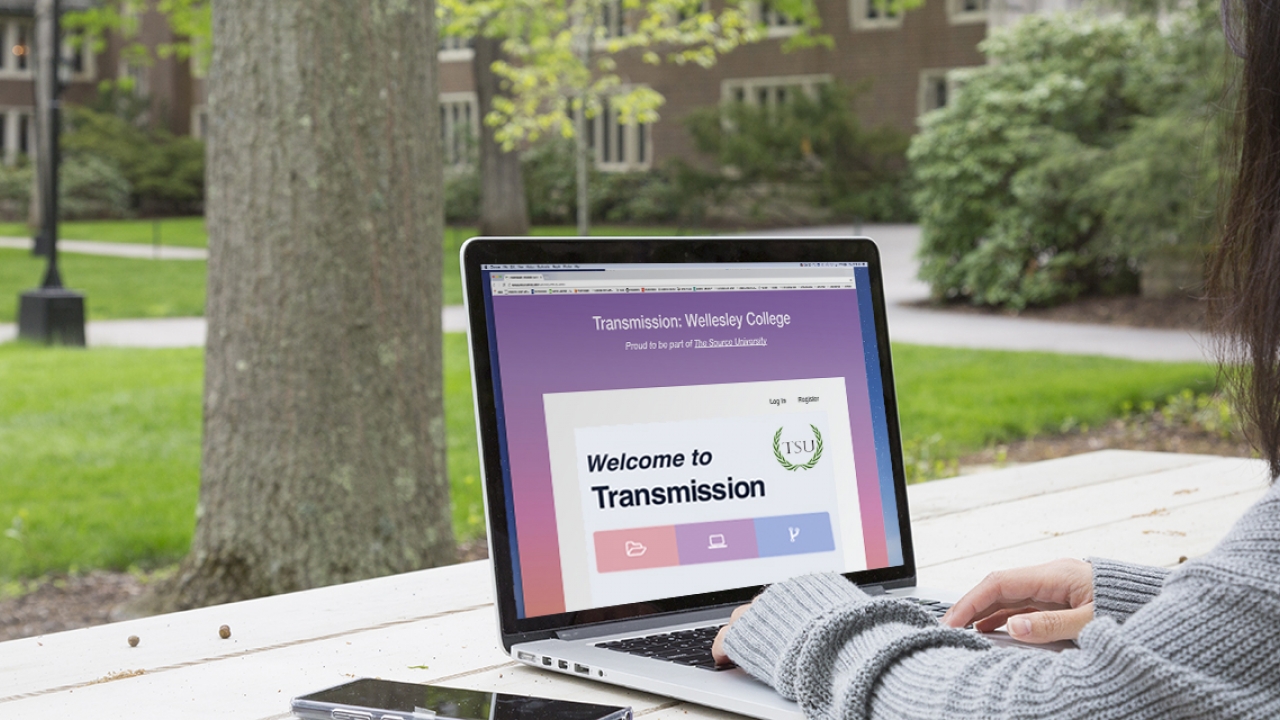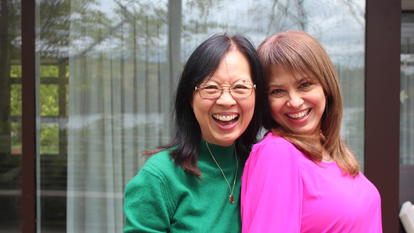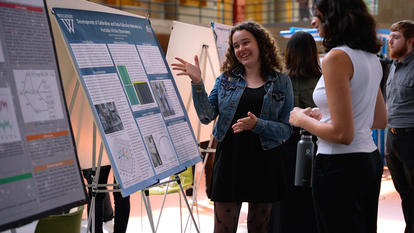Transmission, an Online Diversity Training Platform Created by a Wellesley Student, Expands Its Mission and Outreach

Since she introduced Transmission, a first-of-its-kind online diversity education platform, last fall, Nina-Marie Amadeo ’18, a computer science and sociology major, has expanded her patent-pending educational technology into a company called The Source University. The Source offers colleges and other organizations diversity and inclusivity training resources and programs modeled on Transmission’s successful platform.
Amadeo originally conceived Transmission in 2016 as her final project for the course Education and Technologies, taught by Robbin Chapman, former Wellesley associate provost and academic director of diversity and inclusion, and lecturer of education; she actualized it in an independent study the following year. Transmission responds to Wellesley’s need to address the experiences and concerns of its transgender population. As a student activist involved in organizing information sessions on gender identity for the campus community, Amadeo had noticed that faculty and staff rarely attended these sessions, sometimes due to the sensitive nature of the discussions, but often simply because they could not participate during normal business hours.
Transmission focuses on both issues, offering students, faculty, and staff a completely anonymous online tool that’s available any time of day. In addition to a basic course on the complexities of gender identification, called Gender 101, Transmission offers a question-and-answer forum that allows transgender students, who are compensated for their contributions by the office of LGBTQ Programs and Services, to answer faculty and staff’s questions. All parties in the forum are anonymous. This innovative, dual-anonymity platform removes any potential power dynamics involved in faculty-student or administration-student interactions; gives students a safe space to voice their concerns and provide feedback; and enables a high degree of authenticity and honesty.
“Transmission is an easy and confidential way for faculty and staff to inform themselves and, when in doubt, ask a question anonymously,” said Assistant Dean Leah Fygetakis, who oversees programs and services for LGBTQ students. “I have been here seven years, and the increasing percentages of students who identify as LGBTQIA [lesbian, gay, bisexual, transgender, queer, intersex, and asexual] go beyond saying that it is an ‘upward trend.’ It is a reality.”
Among the concerns Fygetakis hears most often from LGBTQIA students is that they are frequently misgendered, which has an adverse impact on them. Fygetakis said that as an educational resource, Transmission is crucial in that it “helps faculty and staff feel more confident and empowered in…fostering a classroom and departmental environment where our students feel recognized and comfortable in bringing their whole authentic selves into the conversation.”
Chapman, who supported Amadeo’s initial conceptualization and launch of Transmission (she left Wellesley recently to become the Harvard Kennedy School’s first associate dean of diversity, inclusion, and belonging), said, “Transmission is a technology that is invaluable for campuses, as well as for sectors beyond higher education. As far as diversity and inclusion, the technology lowers barriers to the asking of questions and learning that we all need to engage in if transgender people are to feel they belong to our community. As a learning technology, [Transmission’s] design assures that those who use the system are positioned to learn, contribute, and have agency in how their interactions can be most productive.”
Transmission’s success, reflected in its 97 percent user satisfaction ratings, led Amadeo to launch The Source University; she is now in talks with a few universities about rolling out its Transmission platform, and she is also designing a new dual-anonymity module aimed at supporting disabled students.
“Long-term, I would love to see colleges, universities, and businesses across the country adopt our diversity training platforms,” said Amadeo. “For educators, especially, it is important to be cognizant of perspectives and experiences outside of your own.…From a business perspective, the same is true when trying to meet the needs of your consumers. Our larger mission is to lessen micro-aggressions and bigotry against various marginalized groups through direct education from members of those groups, while also being able to compensate those same members for their experiences and knowledge.”
In September, Amadeo will join Google as a software engineer. In addition to her Google duties, she will continue developing The Source University and its suite of diversity training products and services.



